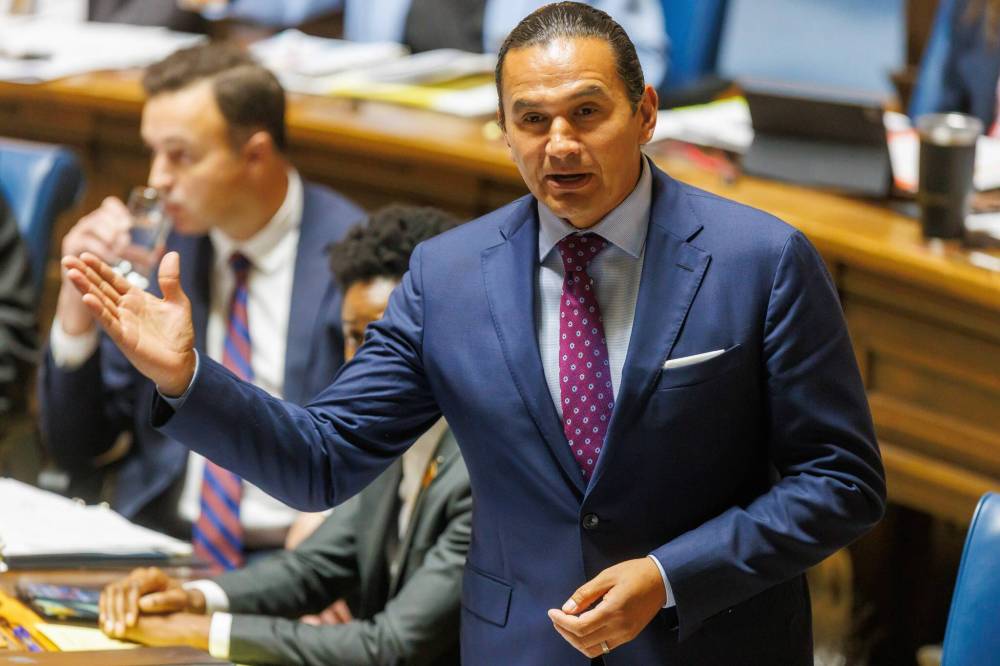Politics
Premier Kinew Criticizes Judicial Bail Decision Amid Controversy

Premier Wab Kinew has stirred controversy by publicly criticizing a recent bail decision made by a provincial court judge, following backlash over the release of Navjeet Singh. Singh is accused of causing a fatal highway collision in November 2024 that resulted in the deaths of a Manitoba woman and her eight-year-old daughter. The remarks came during a session in the Manitoba legislature, where Kinew’s comments sparked a debate about the independence of the judiciary and the role of public sentiment in judicial decisions.
Kinew’s comments were prompted by remarks from Obby Khan, leader of the Progressive Conservative party, who condemned the decision to release Singh on bail. Following a Canada-wide warrant for his arrest, Singh returned to Canada in August and was subsequently taken into custody. During his bail hearing on August 28, 2024, the Crown attorney argued for Singh’s continued detention, citing concerns that his release would undermine public confidence in the justice system. Nevertheless, the judge determined that Singh could be released with conditions, which included the surrender of his passport and a requirement to remain at home in Ontario.
In the legislature, Kinew expressed agreement with the Crown’s position, stating, “I think we have to— with all respect that we have for the justice system — encourage our judges and justices of the peace to reflect on the role that their decisions will have when they are learned of by the public.” His comments suggest that judges should consider public opinion alongside legal standards when making decisions about bail, a notion that raises significant concerns regarding judicial independence.
Kinew’s remarks have drawn criticism for seemingly undermining the impartiality of the judicial process. Critics argue that suggesting judges should factor in public sentiment risks compromising their ability to make decisions based solely on the law. The premier’s approach has been characterized as a form of pandering to public fears, particularly in light of widespread concern regarding violent crime and public safety.
While Kinew might believe he is addressing a broader issue, his focus on Singh’s case appears to indicate a more targeted criticism of the judiciary. This conflation of public safety with public opinion is viewed by some as a dangerous precedent that could lead to leniency in judicial decisions based on fear rather than fact. The complexities surrounding bail decisions are often misunderstood by the public, and the premier’s comments may exacerbate this misunderstanding.
The judicial system operates on the principle that individuals are presumed innocent until proven guilty. In Singh’s case, he had no prior criminal record, voluntarily returned to Canada, and had a family member post a cash surety for his release. The charges related to his absence from Canada last fall were dropped, indicating that the court did not view this as a significant factor in its decision.
Khan, as a former minister in the previous government, has faced scrutiny for his own role in the debate over bail reform. Critics question whether he would have accepted responsibility for controversial bail decisions during his tenure. The current discussion reflects a broader conversation about the need for systemic reform within the bail system, which both federal and provincial governments are actively pursuing.
As debates over judicial decisions continue, the public’s right to express concern about the bail system must be balanced with the independence of the judiciary. While it is essential to address legitimate fears regarding public safety, reducing intricate legal decisions to political rhetoric risks undermining the very foundations of justice. The ongoing dialogue surrounding bail reform necessitates thoughtful consideration and a commitment to ensuring that the system serves both the public and the principles of justice effectively.
Public confidence in justice remains a significant issue, and as political figures navigate these challenging conversations, it is crucial that they promote understanding rather than sensationalism. The complexity of bail decisions demands informed discourse, away from opportunistic political maneuvering.
-

 World3 months ago
World3 months agoScientists Unearth Ancient Antarctic Ice to Unlock Climate Secrets
-

 Entertainment3 months ago
Entertainment3 months agoTrump and McCormick to Announce $70 Billion Energy Investments
-

 Science3 months ago
Science3 months agoFour Astronauts Return to Earth After International Space Station Mission
-

 Lifestyle3 months ago
Lifestyle3 months agoTransLink Launches Food Truck Program to Boost Revenue in Vancouver
-

 Technology2 months ago
Technology2 months agoApple Notes Enhances Functionality with Markdown Support in macOS 26
-

 Top Stories7 days ago
Top Stories7 days agoUrgent Update: Fatal Crash on Highway 99 Claims Life of Pitt Meadows Man
-

 Sports3 months ago
Sports3 months agoSearch Underway for Missing Hunter Amid Hokkaido Bear Emergency
-

 Politics2 months ago
Politics2 months agoUkrainian Tennis Star Elina Svitolina Faces Death Threats Online
-

 Technology3 months ago
Technology3 months agoFrosthaven Launches Early Access on July 31, 2025
-

 Politics3 months ago
Politics3 months agoCarney Engages First Nations Leaders at Development Law Summit
-

 Entertainment3 months ago
Entertainment3 months agoCalgary Theatre Troupe Revives Magic at Winnipeg Fringe Festival
-

 Politics1 week ago
Politics1 week agoShutdown Reflects Democratic Struggles Amid Economic Concerns




















